Steven Pressfield's Blog, page 7
August 14, 2024
The Mind-Set of the Artist’s Journey
When we embark on the artist’s journey, we take control of our lives.
Things that we did before, we no longer permit ourselves to do.

We no longer demean ourselves. We cease making excuses. Our amateur life is over. We’re warriors now. We are fathers and mothers, even if only to ourselves and to our work.
When we embark on the artist’s journey, we drop out of the gang. We no longer drive drunk or show up late for class or let ourselves get fat. Those days are behind us.
We’ve got work to do.
We have lost time to make up for.
The mind-set of the artist’s journey is the mind-set of the professional.
The post The Mind-Set of the Artist’s Journey first appeared on Steven Pressfield.August 7, 2024
Coming Out
Why are so many gay people artists? Because their sexual orientation (within the context of the fears and prejudices of contemporary mainstream society) has forced them to come to grips with an identity that clashes head-on with the norm.
This is the same condition as you and I on the artist’s journey.

The gay person’s hero’s journey (or that of the Jew or the immigrant or the African-American or any other minority or outsider) carries him to the dead-end where he can no longer “pass” or pretend or assimilate. He has found himself up against this choice: stay in the closet or come out.
In other words: Who am I? What is my authentic self?
In answering this question, the homosexual or the lesbian may find himself or herself saying, “Hey, if I’m gonna come out sexually, I might as well come out every other way too.”
It takes guts to come out. It takes courage to look the world in the eye and say, “I’m not the person you think I am or the person you want me to be. I’m different. I’m not in the club and I’m not gonna be.”
As artists we need that courage too. We need the fortitude to say, even if only to ourselves: “I was not born for this cubicle or this pigeonhole or this conventional concept of who the world thinks I am or ought to be.”
In the end, it’s more painful to stay in than it is to come out.
The post Coming Out first appeared on Steven Pressfield.July 31, 2024
The Amnesiac’s Story
The individual on the threshold of the artist’s journey is like the protagonist in an amnesiac story. I love these. Total Recall, The Bourne Identity and its sequels, and my fave of a couple of years ago, The Hangover.
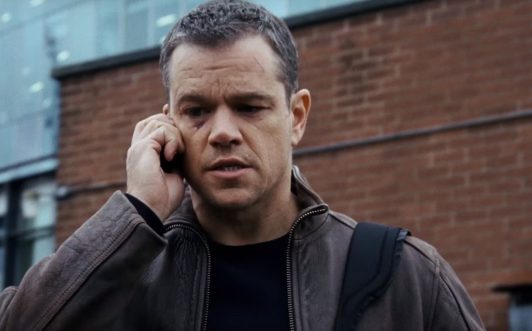
In the Amnesiac Story, the protagonist awakens from unconsciousness in a world he doesn’t recognize. He has no idea who he is or how he got here.
The Amnesiac’s Story is the blueprint for the artist’s journey.
The protagonist in an Amnesiac Story might not know who he is, but it quickly becomes clear to him that he is somebody. He’s not generic, he’s specific. He possesses a distinct set of skills, a gift, a calling.
Stanislavsky taught his acting students to ask three questions of their characters in any scene: “Who am I? How did I get here? What do I want?”
On the artist’s journey, these are our questions too.
The amnesiac’s quest is to retrace his path to the point where it diverged from the authentic. His aim is to peel back the layers of the onion until he gets to the core.
The Amnesiac’s Story conceals (at least) two truths that we must keep foremost in our minds as we pursue the quest for our own authenticity.
First, the amnesiac is somebody. He possesses a true self. He just can’t remember it.
Second, the amnesiac must not and cannot stop until he answers this question. He must call upon all his grit and resourcefulness to uncover, in action and by action, the truth of who he is.
The post The Amnesiac’s Story first appeared on Steven Pressfield.July 24, 2024
Be Brave or Be Stupid
Here’s Philip Roth on the subject of beginning a novel:
I don’t know very much [when I start.] I write my way into my knowledge. Then, if I’m lucky, I get a break. That’s why it’s so important to get started. Because however awful starting is—and it is absolutely awful—when you get into it, when you’ve got ten pages, which may take two weeks, then you can build.
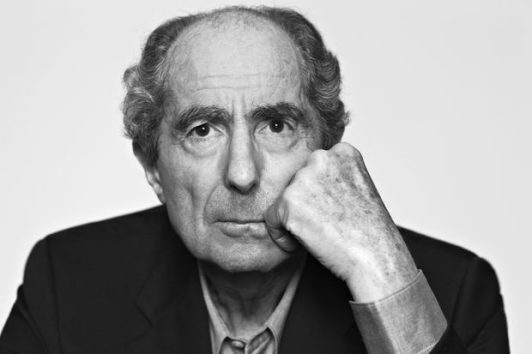 Philip Roth
Philip RothBefore I wrote Bagger Vance, I had no idea I was obsessed with issues of identity and self-realization.
Before Gates of Fire, I had no idea I saw life in terms of a battle. These are huge themes in my life, and I never knew either of them till I saw them materialize out of the keyboard.
This is why the artist and entrepreneur have to be brave or stupid. Each has to jump off the cliff of what-he-thinks-he-thinks in order to land with a glorious splat in what-he-really-thinks.
Or, put another way, he has to forget what he thinks is his voice, in order to speak with what really is his voice.
The post Be Brave or Be Stupid first appeared on Steven Pressfield.July 17, 2024
Authenticity and Power
Power comes from authenticity. When we hear an artist or a politician, a warrior or an advocate speak from her true center, we feel her power. Even Lady Gaga, whose public persona is as artificially contrived as it is possible to be, is authentic in her artificiality.
Her Gaga-ness gives her her power.
 Lady Gaga, Stefani Germanotta
Lady Gaga, Stefani Germanotta“Lady Gaga” is the creative power that was trapped inside Stefani Germanotta. Stefani Germanotta became herself when she uncorked “Lady Gaga,” just as Madonna Ciccone unleashed her charisma when she invented “Madonna.”
I live in Los Angeles. One of the things I love about the place is it’s a city where a person can go to re-invent themselves.
The artist’s journey is the passage by which we re-invent ourselves as ourselves. We discover the self that was slumbering inside us or in chains, waiting to be awakened and emancipated. In re-inventing ourselves as ourselves, we find ourselves for the first time.
Power comes from authenticity.
The more ourselves we are, the more charisma we will project and the greater will be the impact of our words and our actions.
The post Authenticity and Power first appeared on Steven Pressfield.July 10, 2024
A Writing Retreat With Me
Finally, the details have been settled.
The one-day Writing Retreat will take place on September 7, a Saturday, at the Zuma Orchid Ranch in Malibu, California.
Here’s the link for details and to sign up for the Wait List: www.silentwritingretreat.com
 Roda Ahmed and I will be hosting the event on September 7
Roda Ahmed and I will be hosting the event on September 7The subject matter will NOT be the craft of writing. I won’t be talking about structure or characterization or anything like that.
The day will be about the mindset that the writer/artist/entrepreneur needs to start and finish a project like a novel, a long-form nonfiction piece, a memoir, a biography, or any kind of album/game/startup that may take a year or two years … and that will have to be accomplished essentially ALONE, i.e. without an external supporting structure like a school, a corporation, or a community.
In other words: How do you go into a room all by yourself, with just a laptop, and face down your demons day after day after day until you have brought the project to its successful completion?
This will be a serious, hard-core, tough-love day. Don’t sign up if you’re just sightseeing. You’ll be wasting your money.
Come for real.
The post A Writing Retreat With Me first appeared on Steven Pressfield.July 3, 2024
How the Artist Finds Herself
The artist and entrepreneur find their authentic selves not by whom they love or hate, or what they believe, or what feats they perform.
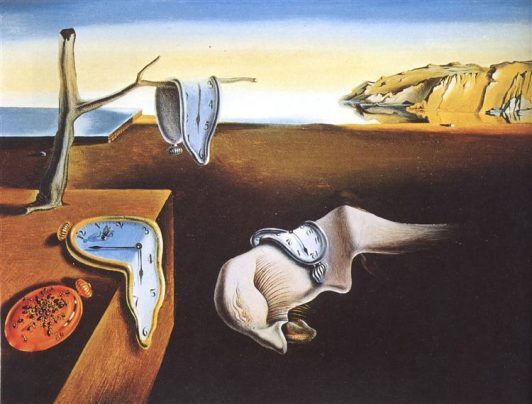 “The Persistence of Memory” by Salvador Dali
“The Persistence of Memory” by Salvador DaliThe artist and the entrepreneur discover themselves by what they create. They don’t know before they create it.
When they see their work on the page or the screen or rising before them forty stories high in concrete and steel, they say, “That’s me.”
The post How the Artist Finds Herself first appeared on Steven Pressfield.June 26, 2024
Learning and Unlearning
The process of finding our own voice is not one of learning, but of unlearning. Not of acquiring baggage but of jettisoning it.
To find our true voice, we de-program ourselves of every convention, identity and belief that has been hammered into our skulls by well-meaning parents, teachers, coaches and counselors; by our families, our religions, our ethnic and regional origins. We hollow ourselves out and refill from scratch.
The appeal of cults or extremist organizations is to this (honorable and sacred) seeking of one’s true self. The cult offers to take away the pain of not-knowing-who-we-are by proffering a ready-to-wear, off-the-shelf alternative.
 “Il Duce” Benito Mussolini
“Il Duce” Benito MussoliniThis cult-self comes to us complete with new friends (other cult members, possibly even lovers), as well as an entire world-view and cosmology, an approved diet, attire, schedule for the day, month and year. In the cult, we are told whom to love, whom to hate, how to eat, sleep, breathe and even how to die.
The problem is that the self we are being presented with is not our own.
The artist’s journey is the opposite of cultist’s. That’s why when cults like the Nazis or the Fascists take power, among the first groups they exterminate are artists and innovators.
The post Learning and Unlearning first appeared on Steven Pressfield.June 19, 2024
Story and Understory
One of my favorite scenes in movies of the past few years is the Frozen Park Bench scene in the first of the Jason Bourne movies—The Bourne Identity.
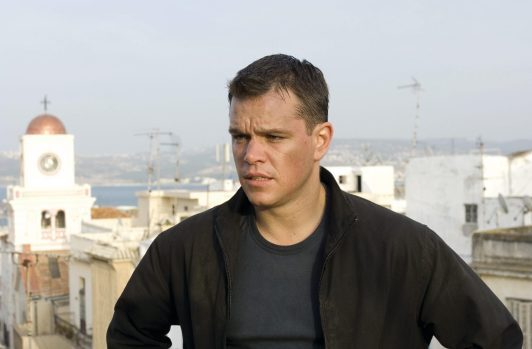 Matt Damon as Jason Bourne in “The Bourne Identity”
Matt Damon as Jason Bourne in “The Bourne Identity”To refresh your memory:
It’s early in the story. We’ve met Jason Bourne (Matt Damon) and learned that he is a young man who has lost his memory. He doesn’t know who he is. He’s an American on his own in Europe, specifically Zurich (where Swiss bank accounts are) in the depths of winter.
Jason’s recall may be void at the moment, but he has been able in the film’s early scenes to deduce a few things about who he might be.
First, he knows he is somebody specific. He does have an identity. He just doesn’t know what it is.
He knows something mysterious (and almost certainly nefarious) has happened to him to blot out his memory.
He knows he is part of some ongoing plot or scheme that involves other individuals, possibly allies, more likely enemies. But he doesn’t know who they are or how he fits in with their designs.
Here’s the Park Bench Scene:
It’s night. Outdoors in Zurich. Freezing cold. Jason is in jeans and a threadbare sweater. He stops in a park and lies down on a bench, just trying to survive till morning.
Two Swiss patrol officers appear. They roust Jason roughly, start to handcuff him. Suddenly …
Jason turns into a kung fu master. Chop chop bam bam he hammers both officers with Bruce Lee-like skill, using only his bare hands. He knocks the cops cold.
For a moment Jason stands over his victims, staring at his own hands, amazed at what he has done. Then he dashes away into the night.
This scene, or something like it, is a staple of action novels and movies. It always works. It always plays great.
It hooks the reader/viewer.
It propels the story forward.
Why?
Because implicit in it is a mysterious and exciting understory.
The reader/viewer wants to learn that understory. She can’t help asking of the Jason Bourne character:
Who is he?How did he acquire these skills? Did somebody train him? Who? For what purpose?Why is he now “rogue?” What happened to him? Why?Are other people after him? Is he being hunted? By whom? For what purpose?Was he on some kind of assignment? Did something go wrong? What?Is he a good guy or a bad guy?Two of the last four books I’ve worked on have had understories. In both cases the reader enters the narrative (that is, the story begins) at a point when the understories are well advanced. “Something” is going on. The protagonist becomes aware of this, and involved emotionally and dramatically in it, at the same time as the reader.
Both reader and protagonist are asking, “What’s going on beneath the surface? Hidden forces, secret characters are at work here. Who are they? What do they want? How will their machinations affect our hero? Is he/she in jeopardy from them? Will he/she prevail?”
Ask yourself of the material you’re working on, “Is my story happening in real time only? Or does it have an understory?”
If it does, you’ve got a powerful tool at your disposal to make your novel or screenplay really hum.
The post Story and Understory first appeared on Steven Pressfield.June 12, 2024
YAEL DAYAN 1939-2024
At 0815 hours on 5 June [1967] we gambled all we had. What for other countries would have been defeat, for us would mean extermination. It was not possible for us to lose the war and survive and each man carried this knowledge in his heart when we moved west.
Yael Dayan wrote Israel Journal: June 1967 in two weeks, in the immediate aftermath of the Six Day War. She wrote it in English. To this day, I would put it in the top fifty books ever written on war.
 Yael Dayan
Yael DayanMs. Dayan was the daughter of Moshe Dayan, who as Army chief of staff and later Minister of Defense, saved the fledgling nation of Israel twice (in the ’56 Sinai Campaign against Egypt and the Six Day War of 1967 against Egypt, Syria, and Jordan), as well as nearly losing everything in the Yom Kippur War of 1973.
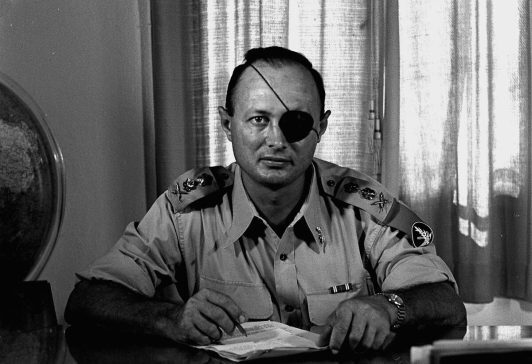 Yael’s father, Moshe Dayan
Yael’s father, Moshe DayanYael had become something of a celebrity herself, at age twenty-eight, as a novelist and journalist. She was in Athens in June ’67 when Egypt’s president, Gamal Abdul Nasser, sent a thousand tanks and 100,000 men to Israel’s southern border, vowing to wipe out the Jewish state. Ms. Dayan was then a segen mishne, a second lieutenant, in the Israel Defense Forces. She returned at once and was assigned as a correspondent to the armored division under General Arik Sharon (later Prime Minister) on the Egyptian frontier.
Whatever side you may find yourself on in the current Gaza War, I highly recommend Ms. Dayan’s account of her experiences over those fatal next few days. Israel Journal: June 1967 provides the deep context—historical and political—that seems missing in so much of today’s press coverage. It’s a short read, packed with vivid characters and insights.
I should add that, whatever literary style I myself may possess, I stole wholesale from Yael Dayan.
Ms. Dayan was a lifelong and passionate supporter of the idea of a Palestinian state. She was the first member of the Knesset to meet with Yasser Arafat. She was much criticized, even vilified, for these acts, which she stood by all her life. Neither stopped her from being a fierce patriot for the state of Israel.
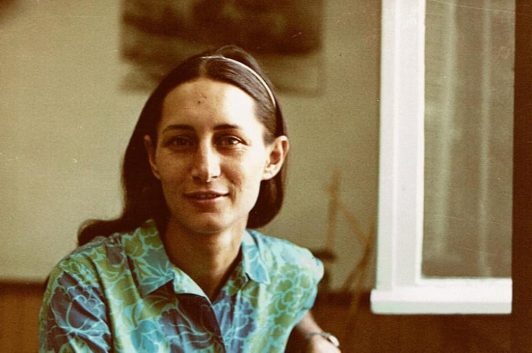 Yael Dayan
Yael DayanI interviewed her in 2012 in her office at the City of Tel Aviv for my own book, The Lion’s Gate. I had read all her stuff and was wildly psyched to get her first-person takes on certain incidents and personalities. But to every one of my questions, she answered, “It’s in my book.” I couldn’t get anything more out of her. Finally I said, “Do I have your permission then to paraphrase from your books as if you had answered in-person in this interview?”
“Go ahead,” she said. “I hope you’ll make the stories better.”
I tried, but I couldn’t top her. She was a great one. Yael Dayan. “We will not see her like again.”
The post YAEL DAYAN 1939-2024 first appeared on Steven Pressfield.


